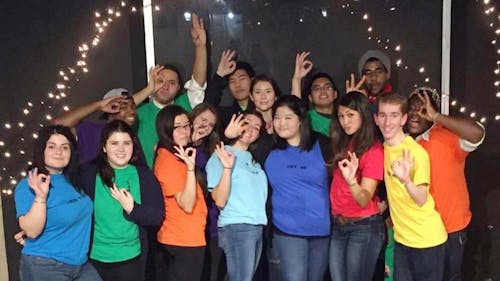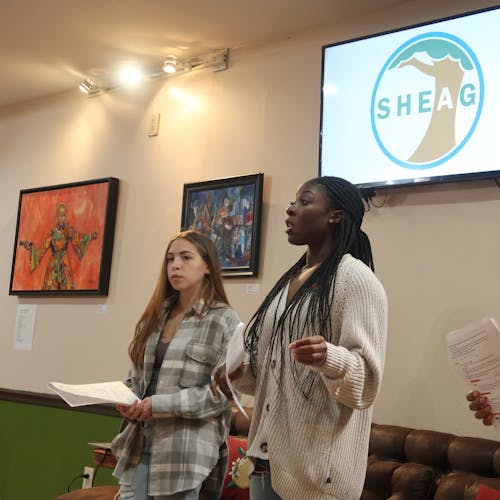Students in OrphanSporks compose, perform a capella music

Rutgers’ diverse student population continues to give rise to new and creative organizations. OrphanSporks, an a capella group, has found its niche in the realm of performing arts at Rutgers.
OrphanSporks is one of many a capella groups on campus, but is one of only a few with no cultural affiliation. It was established in the late 90s after a member found personal inspiration.
“The founding members had a band in high school called ‘The OrphanSporks.' When they came to college, the band didn’t pan out, so they started this a cappella group and it just stuck,” said Iris Goldman, treasurer of the club and a School of Arts and Sciences junior.
Goldman and 15 other students make up OrphanSporks. In past years, some of the members have been music majors, but according to Musical Director and Rutgers School of Health Related Professions junior Amy Kim, the group currently does not consist of any music majors.
Despite its lack of music majors, the musical arrangement process is not affected. Every member has the opportunity to compose their own pieces with the collaboration of their fellow members if needed, she said.
“We have a lot of people who are involved and are interested (in the arrangement process). This year, the people with more experience and musical theory background were paired with others who have less experience,” Kim said.
As musical director, Kim is responsible for everything related to music. She leads the rehearsals, delegates more practiced members to newer members and comments on technicalities like tone and range.
Tone and range are crucial for a cappella arrangements, but more importantly for the auditions, she said. Auditions are held over the course of five days in the first week of the fall semester.
“During audition nights, people come in, sing a scale so we can hear their range, sing a solo piece and then we cut that number down,” said David Blyd, the club's business manager and a Rutgers Business School junior.
It is a rigorous process because a cappella is different from a traditional choir, Kim said. Choirs focus largely on overall musical technique, whereas a cappella groups must also consider having unique individual voices.
With such a specific skill set in mind, audition judges eventually narrow down the 30 to 40 students auditioning per day to a select few, depending on what parts the group is in need of.
OrphanSporks is one of the four contemporary a cappella groups at Rutgers. Although it does not maintain a strict musical time era, a majority of its songs are modern pop, with a few throwbacks from earlier OrphanSporks generations.
Throughout the year, OrphanSporks performs at concerts and gigs, both on and off campus. Many on-campus events involve OrphanSporks in conjunction with similar groups, such as Deep Treble, a fellow co-ed a cappella organization, Goldman said.
“If an organization is hosting an event and wants some musical performance as an opener or as an intermission, we can get invited to — last year we got invited to the Rutgers TED Talk. As for concerts, we have our own concerts as well as concerts with other a cappella groups,” she said.
Kim said that in addition to their usual schedule of twice a week rehearsals and performing at events, the members of OrphanSporks are in the midst of recording their own CD.
This will be the first CD in roughly six years that OrphanSporks will have released, she said. It is projected to have 12-13 original OrphanSporks arrangements spanning the era since the last CD.
“It’s a big project, and it’s huge for us because it’s releasing our sound (to the public). People will review us as a public entity, so (listeners) are reviewing to show other people if we’re worth listening to in the acapella world,” Kim said.
Each a cappella group has its own unique presence in the musical environment. Blyd said that OrphanSporks has one that is eccentric.
“We have an eccentric, but really creative performance style and colorful wardrobe too," he said. "We bring our own brand of fun into the Rutgers community.”
Kelly Kim is a School of Engineering first-year student. She is a contributing writer for The Daily Targum



